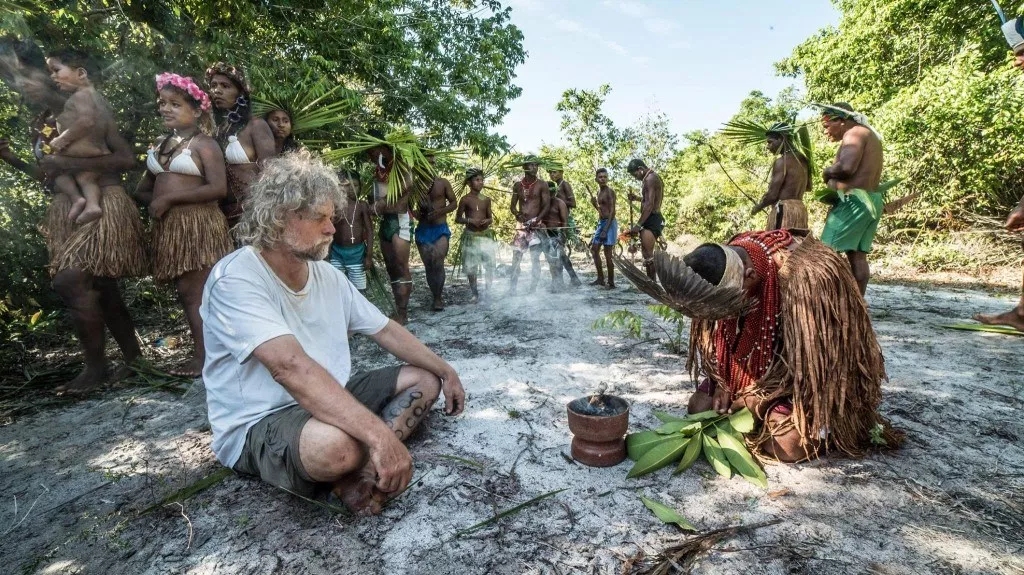
From an interview conducted by Beatriz Garcia, publisher of the Spanish Laudano Magazine, with Fabiane M. Borges, Carsten Agger, Ariane Stolfi and Raisa Inocêncio, participants of the technoshamanism network. English translation by Carsten Agger, Ariane Stolfi, Isabella Aurora and Iaci Kupalua.
We can give a Brazilian point of view that doesn’t represent the history of all the people involved in this network. Since the network is diverse and alter-globalist, each person has their own vision of how they became a part of it. But from a Brazilian perspective we could start with the World Social Forums in Porto Alegre since 2001, where there were already practices that related ‘do it yourself’ culture with traditional cultures and permaculture, where lots of people from free software and DIY networks had met. We could also situate as a specific point the Media Tática Brasil Festival (MTB, “Tactical Media Brazil”), which happened in 2003 in Casa das Rosas, organized by activist groups working with free software and urban art. At that time, the Leftist Party had come to power through the election of president Lula (PT), who nominated Gilberto Gil as Minister of Culture. Gil joined the MTB and expressed interest in taking the project inside the ministry. Very shortly, activist groups were implementing one of the PT government’s biggest Free Software projects, called Cultural Hotspots (pontos de cultura).
Through the implementation of this program, hundreds of hackers, hacktivists and open-source programmers gained access to a ‘deep Brazil’ consisting of communities and ways of life very different from those of the big cities. The word “technoshamanism” started to appear about that time, as a consequence of the meeting of the implementers with traditional Afro-Brazilian, indigenous and riverside communities. The sensation arose that the Free Software movement was not only about technological inclusion but also a meeting point for different cultures, perspectives, knowledges and technologies. It was at this point that the word “technoshamanism” started to show up in the networks, with a number of connotations, some of them more technophobic and other more technophile, but the essence was a re-enchantment with the native cultures, with shamanism, with magic and with the idea that the technologic production was very far from its immanent potential and from the connection with Planet Earth. So in 2014, when the majority of the implementers of the program had already left their government jobs, we decided to make the I International festival of Technoshamanism, following a tradition of festivals that used to relate free software with alternatives or traditionals ways of life as Digitophagy, Submediology, Metarecycling, Tropixel, Technomagic, Satelliteless movement, etc.
The first Festival of Technoshamanism was organized in Arraial d’Ajuda, in the Itapeco Institute of Permaculture, with collaboration of the Bailux lab (an offshoot of the Meteracycling network) the Hacker Bus, Voodoohop, LCCP – laboratory of body-creation-performance-interference, the Pataxó from nearby Aldeia Velha and lots of other contributors. At that festival, it was more clearly defined what technoshamanism is about: 1) Plant
Technology, agroforests, permaculture, water springs, seed banks etc; 2) Production of communities, coexistence, exchange of knowledge and free technology, relations between different communities; 3) Free software, open source, do it yourself culture; 4) Art, subjectivity and electronic technologies: rituals, aesthetic production, music, cinema, videos, performances, imaginary and fictional construction, medicinal plants, teas, baths, all at the same time and now.
After the I Festival several meetings happened, in many of them other partnerships were made, with people from networks like Cryptorave, Chaos Magic, Climatic Caravan, Hacker Bus, Hacker Camping, Baobáxia, etc.
The current stage is to decentralize technoshamanism from Brazil, so the III International Festival will be held near Aarhus (Denmark) under the care of Carsten Agger in July or August of 2019.